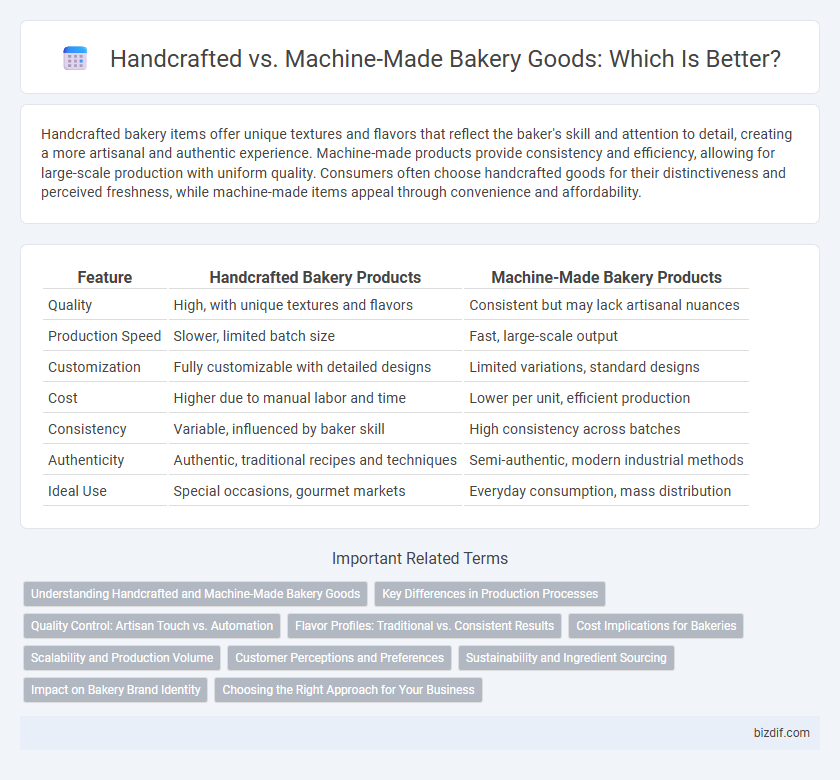Handcrafted bakery items offer unique textures and flavors that reflect the baker's skill and attention to detail, creating a more artisanal and authentic experience. Machine-made products provide consistency and efficiency, allowing for large-scale production with uniform quality. Consumers often choose handcrafted goods for their distinctiveness and perceived freshness, while machine-made items appeal through convenience and affordability.
Table of Comparison
| Feature | Handcrafted Bakery Products | Machine-Made Bakery Products |
|---|---|---|
| Quality | High, with unique textures and flavors | Consistent but may lack artisanal nuances |
| Production Speed | Slower, limited batch size | Fast, large-scale output |
| Customization | Fully customizable with detailed designs | Limited variations, standard designs |
| Cost | Higher due to manual labor and time | Lower per unit, efficient production |
| Consistency | Variable, influenced by baker skill | High consistency across batches |
| Authenticity | Authentic, traditional recipes and techniques | Semi-authentic, modern industrial methods |
| Ideal Use | Special occasions, gourmet markets | Everyday consumption, mass distribution |
Understanding Handcrafted and Machine-Made Bakery Goods
Handcrafted bakery goods showcase artisanal skill, using traditional techniques that enhance flavor and texture through slow fermentation and manual shaping. Machine-made products prioritize efficiency and consistency, producing large volumes with standardized quality and uniform appearance. Understanding the differences helps consumers appreciate the unique qualities of handcrafted items, such as nuanced flavor profiles and artisanal imperfections, compared to the mass-produced reliability of machine-made goods.
Key Differences in Production Processes
Handcrafted bakery products involve artisanal techniques where bakers manually mix, knead, and shape dough, resulting in unique textures and flavors influenced by individual skill and local ingredients. Machine-made baked goods rely on automated systems that standardize mixing, proofing, and baking processes, ensuring consistent quality and higher production volumes. The core difference lies in the balance between the artisanal craftsmanship offering authenticity and the industrial approach enabling efficiency and uniformity in product output.
Quality Control: Artisan Touch vs. Automation
Handcrafted bakery products benefit from meticulous quality control through the artisan's skilled touch, ensuring each item meets high standards of texture, flavor, and presentation. Machine-made goods rely on automated processes for consistency and speed, yet may lack the nuanced adjustments that skilled bakers provide in real-time. The balance between artisan expertise and automation defines the quality spectrum in modern bakery production.
Flavor Profiles: Traditional vs. Consistent Results
Handcrafted baked goods offer complex and nuanced flavor profiles due to artisanal techniques and ingredient variations, enhancing depth and uniqueness in each product. Machine-made bakery items ensure consistent flavor and texture by standardizing processes and ingredient proportions, delivering predictability for consumer preferences. Balancing traditional methods with technological precision caters to diverse market demands for both distinctive taste experiences and reliable quality.
Cost Implications for Bakeries
Handcrafted bakery products typically incur higher labor costs due to the time-intensive processes and skilled craftsmanship required, impacting overall production expenses. Machine-made baked goods reduce labor costs and increase output efficiency, allowing bakeries to scale operations and lower per-unit costs. However, the initial investment in machinery and maintenance expenses must be factored into the total cost structure for machine-made production.
Scalability and Production Volume
Handcrafted baking offers unique, artisanal quality and attention to detail but faces limitations in scalability and consistent high-volume production. Machine-made bakery products enable rapid, uniform output and can meet large-scale demand efficiently without compromising production speed. Scaling production favors mechanized processes, while handcrafted methods prioritize craftsmanship over quantity.
Customer Perceptions and Preferences
Customers often perceive handcrafted bakery products as superior in quality, authenticity, and flavor due to the artisanal techniques and attention to detail involved. Machine-made baked goods are associated with consistency, affordability, and convenience but may lack the unique texture and personalized touch valued by many consumers. Preference leans towards handcrafted items among discerning customers who prioritize freshness, originality, and a traditional baking experience.
Sustainability and Ingredient Sourcing
Handcrafted bakery products prioritize sustainability by using locally sourced, organic ingredients, reducing carbon footprints and supporting small-scale farmers. Machine-made baked goods often rely on mass-produced, non-organic ingredients that may contribute to environmental degradation through industrial farming practices. Emphasizing artisanal methods promotes ingredient traceability and eco-friendly production, fostering a more sustainable bakery industry.
Impact on Bakery Brand Identity
Handcrafted bakery products emphasize artisanal quality and authenticity, reinforcing a brand identity centered on tradition and meticulous craftsmanship. Machine-made goods often highlight consistency and efficiency, appealing to consumers seeking reliable and affordable options but may dilute the perception of uniqueness. Balancing handcrafted techniques with modern machinery can strengthen a bakery's brand by merging heritage with scalability, fostering customer trust and loyalty.
Choosing the Right Approach for Your Business
Handcrafted bakery products offer unique artisan quality and flavor that appeal to customers seeking authenticity and premium experiences. Machine-made items provide consistent production speed and cost efficiency, ideal for high-volume bakeries aiming to meet large demand. Evaluating your target market's preferences, production goals, and budget will help determine whether handcrafted or machine-made methods best support your bakery's growth and brand identity.
Handcrafted vs Machine-Made Infographic

 bizdif.com
bizdif.com